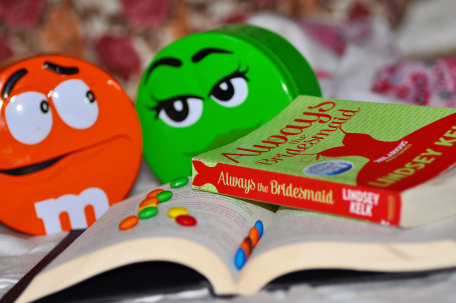
The connection between comedy and tragedy, or between laughter and darkness, is well documented. The trick, in poetry as in any other art form, is the balancing act – if there’s too much fun and silliness, then any attempt to add gravity feels false or awkward. If there’s too much tragedy, then the jokes fall flat.
Jennifer L. Knox has made a career out of high-wiring the balance between raucous comedy and searing tragedy. Here’s a poem from her book Days of Shame and Failure:
The New Let’s Make a Deal
The bedazzled tribe of yahoos has returned
with a new too-tanned, top-heavy prize bunny
swishing her porny French manicure ‘round a Frigidaire.
Monty’s boorish plaid: swapped for Wayne Brady,
dapper in gray. A woman dressed like a bumblebee,
penciled brows arched in permashock, weighs her options:
a bright pink bow-tied box, or the unknown thing
behind curtain #3. She squints into the din of hoots,
wrings her hands. Life could be made easy in an instant.
“I pick the curtain.” Attagirl. The box was a gag: a ham
with straps attached to it. A ham bag. Get it?
Wayne takes a bite to prove the meat’s really real
and the audience goes totes bonkers… we’re interrupted
by news of the hurricane. U.N. delegates have gone on
hunger strike until “a meaningful outcome” is reached.
God, give us one hundred more years until the dawn
of the Kingdom of Roaches, until the sea reclaims Death Valley,
until the end. Hey, what kind of poem is this? Behind curtain #3:
a combo washer-dryer bright as a mirrored iceberg.
Bee lady does a shrieking pogo while a guy in a dinosaur
costume mouths, “I love you, Mom!” into the camera.
It’s that kind of poem: a poem for the end of the world.
— from Days of Shame & Failure, © Jennifer L. Knox 2015. Published by Bloof Books, reprinted by permission.
Now, it’s probably true that every poem about game shows is actually a poem about the apocalypse. But before we get to the bottom of things, let’s take a bit of time to admire how much Knox packs into those opening lines – the language is rich, dense, and hilarious. I want to suggest that there’s something about the rampant use of trochees that adds to the tumbling, brutal absurdity of it all. (Trochees are the opposite of iambs, they go DUM-dum DUM-dum, like a heartbeat.) So “BUNny / SWISHing her PORNy…” or “MONty’s BOORish PLAID.” Like a good standup comedian, Knox has chosen her language very carefully, to pack the biggest punch, and it’s only when we look again that we see how well-crafted it is. I’m not going to, but trust me when I say I could write a full paragraph on the brilliance that is “She squints into the din of hoots.”
There’s also an element of scorn that I want to highlight, because despite its wit, the attitude our speaker takes with the “yahoos” on tv isn’t something we are meant to feel 100% comfortable with. It’s easy enough to make fun of the contestants on shows like Let’s Make a Deal, especially their cartoonish enthusiasms. But we also know that they’re being cast and coached to “go big” for our entertainment. And as the poem progresses, our own role as active audience members is increasingly implicated. And so while the speaker of the poem is mocking them with gleeful precision, there’s a cruelty here that’s going to turn on itself momentarily.
 Wayne Brady, dapper in gray
Wayne Brady, dapper in gray
Meanwhile, as we pass by, stick a pin in “Life could be made easy in an instant.” This desire for simplicity, for an easy life, is also something I want to put pressure on.
The poem makes a big turn at the end of line 13 – from “totes bonkers” to news of a hurricane. A storm big enough for the NBC affiliate to interrupt its daytime programming. And our speaker calls it “the” hurricane, as if she already knows about it, as if this isn’t the first update she’s heard. From the hurricane we travel to more bad news about U.N. delegates on a hunger strike. As far as I know, the only actual example of a UN delegate launching a hunger strike is when Naderev Sano, from the Philippines, did so in 2013 to urge the UN to take stronger action on climate change. This was in the aftermath of Typhoon Haiyan, the deadliest on record in the Philippines, which killed over six thousand people in that country alone.
Knox isn’t necessarily referring to these particular events, but the point is that there are serious, even cataclysmic, things happening in the world. Meanwhile, we are watching Let’s Make a Deal. The lines that follow indicate that our speaker realizes how desperate the situation is, but her prayer for “one hundred more years” isn’t really a solution. In fact it’s a tremendously selfish desire – don’t solve the problem, God, just give us one hundred more years, after which I’ll be dead anyhow. Is praying for a solution to climate change beyond the imagination of this speaker? I mean, as long as we’re praying…! Why are her desires merely for a stay of execution rather than a dismissal of the sentence?
For a moment, then, as a reader I am prepared to turn against the speaker of this poem, and to judge her as just as superficial as the game show contestants she’s been mocking. But then Knox turns the tables on me once again: “Hey, what kind of poem is this?” That’s my voice asking this question. Knox catches us just before we are tempted to leave the room. Whether it’s because of my ethical doubts or because we want to finally, FINALLY! find out what’s behind curtain #3, our impatience finds voice inside the poem, and the poem returns us to what’s most important.
Tell the truth, when you were reading, you were a little glad that the poem turned back to curtain #3 and that Bee Lady won her washer-dryer, weren’t you? You weren’t hoping for more lines about Typhoon Haiyan, or any other terrible storm, or hunger strikes or climate change or the UN. Whatever well-meaning actions you as an individual reading this blog have performed today to avert climate change, it is most definitively not enough to solve the problem. Whatever you can do, it’s not enough. You are powerless before the forces – meteorological, economic, political, historical – that doom us to destruction. And so no wonder we long for our easy entertainments, including the entertainment of making fun of those who give us easy answers. The world is careening towards destruction, but Bee Lady has a new (energy efficient? water conserving? nah.) washer-dryer to make her life easier and good.
This is partly why this poem really is about the end of the world, as it admits in the final line. We have pivoted from the game show and the disasters to the subject ultimately being about our childish, understandable response to our powerlessness. That’s the real tragedy underneath the comedy.
To me, these daring leaps are what separates Knox’s poem from other poets, whether they are climate activists or pop culture satirists. The fact that she can get all that into one poem, as well as our wavering between moral horror and simple glee, is totes bonkers.
Advertisements Share this:





